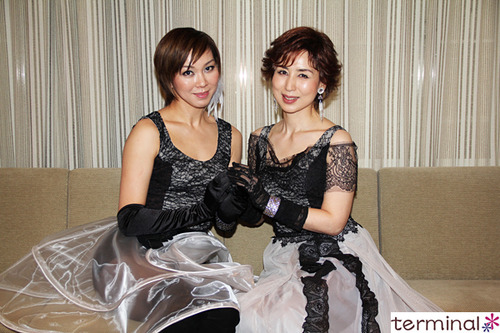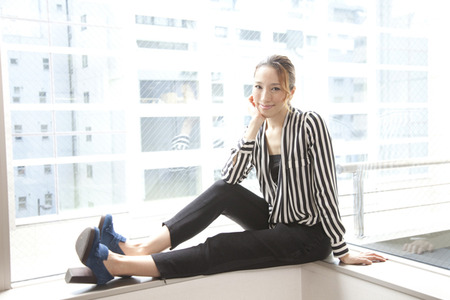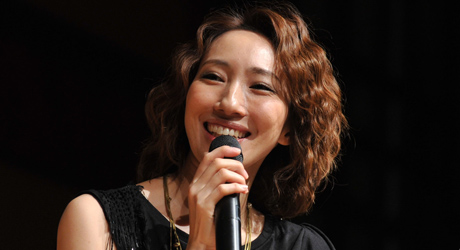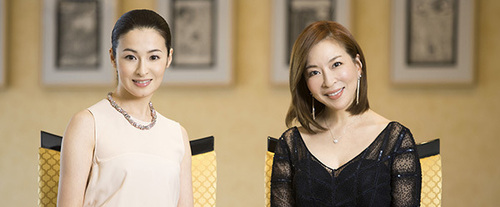A commemorative performance for the Takarazuka Revue’s 100th anniversary will be carried out. The title is Celebration 100! Takarazuka ~This Love, Forever~. A group of experienced Takarazuka top stars will unfold famous Takarazuka songs and scenes that will be handed down for eternity. We requested to talk with two of the performers in this production, Mori Keaki and Kozuki Wataru. Before now, these two have appeared together in the musical DAMN YANKEES as well as DREAM, A DREAM. They will discuss their impressions of each other that they don’t normally talk about, as well as tell stories about their memories prior to now.
—–When Mori Keaki-san was top of Yukigumi, Kozuki Wataru-san made her debut. When and how did you two first meet?
MORI: When I was inaugurated as top, a TV program called “7pm World Dispatch” (Chikyuuhatsu 19ji) did a documentary, and in a scene they showed of the music school, Wataru was there! A few days ago, I was transferring some old videos to DVD, so when I saw that one for the first time in ages, there was Wataru marching in her school uniform. I think the scene was probably showing the graduation ceremony or makeup coaching. I thought, “Ah! It’s Wataru!”
KOZUKI: The 75th class was also featured in that “7pm World Dispatch” documentary, we were shown putting on false eyelashes and stage fighting. We were still so young and not used to anything…
MORI: Since I knew her well on a personal level, I didn’t associate her with her year in school, but when I watched that recently I was surprised that she graduated from music school while I was top! From that time on she really stood out, and even now that really hasn’t changed.
KOZUKI: I lived in a dorm even after I entered Takarazuka, and back then I heard lots of stories from the Yukigumi person who shared a room with me, and I went to see Karincho-san’s performances very often. I loved her top debut show La Passion!
(at this point Kozuki-san starts singing “La Passion!” and Mori-san smiles and says, “that was really a great song!”)
Speaking of which, Karincho-san is synonymous with “passion.” That’s the impression I get.
MORI: Wataru broke out the dance and the choreography just now, it surprised me. As expected of her! (haha) It seemed like “passion” was also director Okada Keiji-sensei’s impression of me, so I was extremely happy to be given a show called La Passion! and my club now and in Yukigumi is even called “Passion Club.” “Passion” is such a great word, isn’t it. Back then we’d chat when we saw each other, but we never got to stand on the same stage. But after we left we appeared together in the musical DAMN YANKEES. That performance was Wataru’s first after leaving Takarazuka, right?
KOZUKI: That’s right. We got to appear together in my first post-Takarazuka production.
MORI: There’s significance to that: Wataru debuted when I became top, and we appeared together when she was a first-year actress… we’ve got a connection.
KOZUKI: At the time of the production announcement for DAMN YANKEES, I had no idea what to do. During the press conference, Karincho-san said to me, “When I did Guys & Dolls, I was told, ‘sex change, GO!’ (haha)” and that calmed me down on the spot, it was really very reassuring. I thought, “I’ll follow you!” (haha).
—–Then last year, you appeared together in DREAM, A DREAM. That was a really varied show.
MORI: Since singing was my main thing, I was singing throughout the whole show, and since Wataru’s main thing was dance, she danced the whole time. It was a production made up of only Takarazuka OG, but in each of our turns we turned up the volume in an effort to outdo our Takarazuka era.
KOZUKI: Everyone was arranged across three acts, so when it wasn’t your turn you were changing costumes or running around.
—–Because there was also a nihonmono show, right? Personally, I was happy to be able to see Mori-san’s figure dressed as a young Edo-period man once again.
KOZUKI: When I saw her in the training room, I also thought, “YES, THANK YOU!!” When I realized, “I get to see this live!” every cell in my body went ZWAAAAAAH—!
MORI: Aw, I’m happy to hear that. Thank you. Rehearsal really was a lot of fun. We got to inspect all the different scenes. When the actual performance started, we didn’t really get to watch the other scenes. We were either performing, running around, or changing our makeup. It was a big frenzy. I never thought I’d have the opportunity to do such a show more than 20 years after I’d graduated from Takarazuka.
KOZUKI: Having the privilege of being together with Karincho-san in an OG performance, it was like time warping myself back to my debut. In the training room, I got to hear her pure voice as opposed to her voice through a microphone, and I was so impressed. After the beginning of the performance, in the second act there’s a scene where I go out to meet Karincho-san, and from the wings of the stage whenever I heard her calling out, I got really happy and it was a lot of fun.
MORI: I think it’s really interesting how Wataru’s generation watches us with that kind of feeling, while we watch Ootori Ran and Hatsukaze Jun etc. as if they’re gods. Seeing the underclassmen straightening up around us, I thought “how cute!”
—–That’s something characteristic of Takarazuka, isn’t it.
KOZUKI: Due to the nature of an OG production, you spontaneously take on the role of an upperclassman or lowerclassman.
MORI: That’s right. So in today’s “Celebration 100” production announcement, since in relation to me there were no upperclassmen, I felt just the right amount nervousness. About once every 5 years there’s an occasion when I’m the most senior, but surprisingly I don’t feel very tense at those times. This kind of feeling is also interesting.
—–Among the members who are participating in all performances of Celebration 100, Mori Keaki-san, you’re the most senior. How does that make you feel?
MORI: I have strong feelings about it. Being able to sing and dance as an active performer at this critical juncture of Takarazuka’s 100th anniversary, I’m so happy.
KOZUKI: At today’s production announcement, I heard Karincho-san’s rendition of “Sumire no Hana Saku Koro.” I felt the life of this production, like a single work will be born through these regular members centered around Karincho-san. She wraps all of us up warmly, and it looks like it’s going to be a lovely company.
MORI: It will be wonderful if it does turn out that way. I think this year being the 100th anniversary, it’s a time when the bonds among all of Takarazuka are vital. So regardless of age, position, or relationship, I want to show everyone the wonderful bonds among the entirety of Takarazuka.
—–Mori-san, what do you think Kozuki Wataru-san’s appeal is from watching her, and Kozuki-san, what do you think Mori Keaki-san’s appeal is?
MORI: Since she was an underclassman, the atmosphere she brings about has not changed at all. At today’s production announcement, Miki Akio-sensei said, “Takarazuka’s virtue is that it’s a pure place,” but Wataru in particular has a pure heart. She’s a sweet girl by nature. And then the way she sits up so straight, it’s so cute!! There’s an imbalance between her appearance and what’s inside. She has a large physique, but the soul of a young lady. This gap is really charming. From here on I think I’d like her to treasure her sweetness as a woman. Wataru studiously goes to see shows very often. She’s come to my shows a lot too.
KOZUKI: Kyaaaaa, that makes me happy. Thank you. I’ve been watching Karincho-san’s performances for a long time, and in Takarazuka her manliness was full-throttle, and she seemed to encompass everything with her enthusiasm, and she was really superb, then since she’s left I’ve continued to see her perform as an actress, and whenever she sings, that entire life as a performer appears. In a single song expressions of her past and where she hopes to go from now on come out, and her presence is overpowering. How someone could do all that just by the way they sing, it impresses me every time.
MORI: If you praise me like that, I’ll probably treat you to anything (haha)
—– Well then, even if it’s difficult, can you tell us the secret to that?
MORI: I’m happy that Wataru feels that way. I think I just really love the world. Even trivial things can make me really happy. For example, if it’s a really beautiful day, I’m the type who will get extremely happy, and look to the sky and say “thank you.”
—–Having experienced the breadth of your singing and acting, hearing those words now I really understand.
KOZUKI: Me too!
MORI: I have a feeling that as the years have piled up, that sentiment has gotten stronger. Even now of course I’m thankful to Takarazuka, but with this year being the 100th anniversary, all over again I’m feeling my gratitude toward having had the opportunity to enroll in Takarazuka and being able to do so many different things there, I’m recognizing how wonderful that all was in a whole new light. Today, I’m so thankful to hear that Wataru thinks that way, and I’m so grateful that so many people came to the Celebration 100 production announcement.
—–The people who appeared in today’s event were only a small part, and I think there are a lot of people who are anxiously waiting to hear about the production announcement. It may be presumptuous, but it’s with these people’s feelings in mind that I’m doing this interview today.
MORI: Today again we felt like we have to do our best at the performance!
KOZUKI: Yes! All of us who have the privilege of taking part in this production are really happy about it, and we want to deliver these feelings through the performance.
—–Today, Miki-sensei talked about showing the “legend of Takarazuka” through this production, but what do you think the “legend of Takarazuka” is?
MORI: This is a funny story I heard a little while ago, but when there’s an early morning performance the curtain rises at 11am, and then there could be a revolution, a raid, you become a space alien, or a snake, or a tree… the productions that are done have a really wide variety of subjects. To that end, Takarazuka isn’t just a framework, but a world where dreams happen. Moreover, all the roles are played by women. That also has to be part of the legend. Each person is part of the legend as a whole, like how gems fill a jewel box. You can’t call it anything but a legend!!
KOZUKI: The stage is a very special place, and I want the audience to enjoy the sense of identification between themselves and the performance, and the dream-like moments overflowing with love. This time in Celebration 100, we’re putting on Takarazuka’s famous songs and scenes together with the beautiful costumes. I wonder if we’ll be able to send the audience into kind of a time warp to those past eras.
MORI: Each fan has experiences with legendary productions and performances. Doing that now, being able to do a revival live, might even be a legend. I may not exactly remember my lines, but tomorrow when they tell me “you’re going to play Andre from Rose of Versailles” or “you’re going to play Oishi Kuranosuke from Chuushingura,” the feelings will rush in with a POW; Takarazuka is a place that enables you to fly. This is something you can’t taste in the real world. There is so much that is only possible in Takarazuka.
—–Watching DREAM, A DREAM, it wasn’t only interesting to see a revival of that person singing that song, but each person seemed to have “powered up,” with the addition of the experiences that have been cultivated since leaving Takarazuka, and then when they all came together I felt, wow, I saw the underlying power of a Takarazuka OG performance letting loose all of that astounding energy.
MORI: I’m so happy you had that impression.
KOZUKI: It makes me happy too. DREAM, A DREAM was a totally fresh revue production, but this time in “Celebration 100” since there are also revival scenes, I’d like to be able to show an even more upgraded version of the meaning of the Takarazuka otokoyaku and musumeyaku.
—–Well then, finally, please tell us your aspirations for Celebration 100 one more time.
KOZUKI: I’m truly happy that through this production I’ll have the chance to celebrate the 100th year of Takarazuka together with the fans. I will express my feelings of gratitude and love. Please come see it!
MORI: Together with everyone who loves Takarazuka, and everyone who has participated in Takarazuka, this year for one year I feel like I’m returning to being a sienne, and I want to burst forth carrying all of my sparkle, my vigor, and my passion. Since it took this many years to run toward the 100th anniversary, I’ve been thinking lately that perhaps after this 100th anniversary performance is over it will feel a bit lonely. Since I don’t think there’s ever been an OG performance of quite this scope, I want to enjoy it to my heart’s content, and put my absolute best effort toward being able to convey a great many dreams to the fans.




